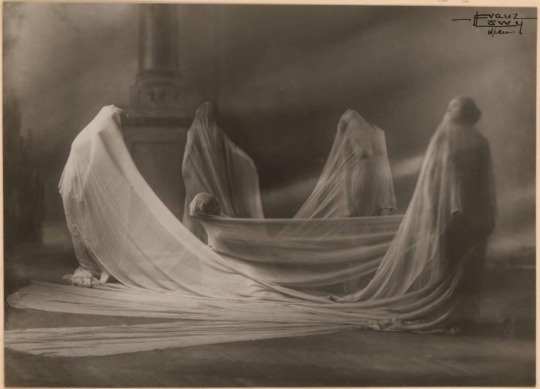#Franz Lowy
Text

Franz Löwy ~ Grete Wiesenthal (1885-1970), full-figure portrait, dancing with a glass in hand, 1918. Die Dame 16/1918 | getty images
view more on wordPress
#Grete Wiesenthal#franz loewy#Franz Löwy#danseuse#die dame#role portrait#Tänzerin#danzatrice#bailarina#die dame magazine#Franz Lowy#glas#dancer#Molière#Moliere#Rollenporträt#Rollenfoto#1910s#The Bourgeois Gentleman
121 notes
·
View notes
Text
Edward Sapir
Edward Sapir,
Edward Sapir was born in Europe in 1884 in what was then Lauenberg, Poland. His family was Jewish and he grew up speaking Yiddish rather than Polish or German. His father Jacob dreamed of being a star at the Berlin opera but was both Jewish and "too short" (Darnell bio, 2) and settled for a career as a cantor, despite the fact that he was not very religious himself. The Sapirs moved to the US to live the American dream, and like so many other Jewish immigrants to the US in this period, they they ended up in New York City. For the rest of his life Sapir came to see himself not as an American or European, but as New Yorker.

Edward Sapir, left, and his brother Max, via Darnell’s biography Edward Sapir.
Sapir showed signs of brilliance at an early age. He was a pattern person, and his two loves were language and music — two systems whose beauty lay in the hidden rules and symmetries which they followed. He attended Columbia on a scholarship, were he threw himself into the study of language (his only extra curricular activity was piano). Eventually he discovered Franz Boas and his work on American Indian linguistics. Sapir was one of the first generation of Boasians, along with Alfred Kroeber, Robert Lowie, and others. While Kroeber would go on to become the most institutionally important of Boas's first generation of students, Sapir was perhaps the most brilliant, and quickly established himself as the foremost expert in Native American languages.
White settlers in North America were perplexed by Native languages. They were supposed to be as 'backward' and 'primitive' as Native peoples were presumed to be, but anyone who paid attention to them quickly recognized they were complex, grammatical, and very different from the Indo-European languages studied by philologists of the period. Boas had a natural knack for language and believed in collecting texts in Native American languages, the direct words of indigenous people, the same way that Europeans had writings from Classical authors. Sapir soon eclipsed Boas in the study of Native languages. He had technical training in the grammar of a wide variety of languages, and could use the tools of the then-new discipline of historical linguistics to help trace the genetic relations between languages. In one particularly awe-inspiring exercise he demonstrated that the Navajo’s ancestors were from the arctic by demonstrating that the words for ‘snow’ and ‘sand’ were related.

Edward Sapir. This oft-reproduced image is from the NAS obituary of the well-known linguist and anthropologist.
Sapir received his Ph.D. In 1909 and then in 1910 got a job working for the Canadian government organizing anthropological research in Canada. At a time when anthropology jobs were scarce to non-existent, Sapir had landed the job of a lifetime: the chance to shape the discipline of anthropology in an entire country. And yet Sapir soon found the job had several downsides. Unlike Boas, he didn’t like administration and wasn’t good at it — and yet that was what most of his job involved. The government wanted him to collect material culture for Canadian museums, but he was a linguist. He also wasn’t training graduate students, a key way to ensure that your memory and influence continues on. Finally, he was living in Ottawa, far from his beloved New York. The Canadian capital was stultifying and backwards by comparison. These difficulties were soon compounded by personal tragedy. Sapir's wife Florence grew sick, suffering from a terribly illness which slowly sapped her health and sanity before she passed away. When World War I began, the Canadian government pulled funding away from museums and into the military, leaving Sapir with less of a dream job and more of an unfounded mandate. Canada begin to feel more like a cage than an opportunity.
During this period, Sapir engaged in a good deal of soul-searching. He began writing poetry, and even published a volume of his work. He also deepened his participation in what might be called 'cultural criticism'. How, he asked, can we lead culturally rich and fulfilling lives? Sapir found Orthodox Judaism stultifying and backward, so that was not an option for him. The great European traditions also held little of value to settlers in the United States, who were no longer European. Some argued the US had its own unique 'melting pot' culture. But Sapir (sadly) hated jazz and was disgusted by the cheap consumerism of America and the hollow lives industrialism forced on workers. The solution, Sapir proposed, was a genuine culture informed by the past but not reduced to it. This formulation is valuable for anyone interested in cultural authenticity today, whether Jewish, settler, or indigenous.
It was also during this period that Sapir was swept into a romantic triangle with Ruth Benedict and Margaret Mead. Sapir began corresponding with Benedict just as she was finding success as an anthropologist and poet. They exchanged poetry and quickly formed a bond. Benedict helped care for Sapir’s children when he and his wife were in New York for her medical treatments. When his wife passed away, Sapir fell in love with Benedict. Unfortunately, however, Sapir was old-fashioned and, frankly, something of a misogynist. For him, Benedict was the only person intellectually brilliant enough to serve as a housewife who could provide conversation for him and be a positive cultural influence on the children. Benedict was already stuck in a loveless marriage were she had to subordinate herself to the needs of her husband, and so she passed on Sapir and turned to an on-and-off romance with Margaret Mead. Sapir ended up marrying someone else.
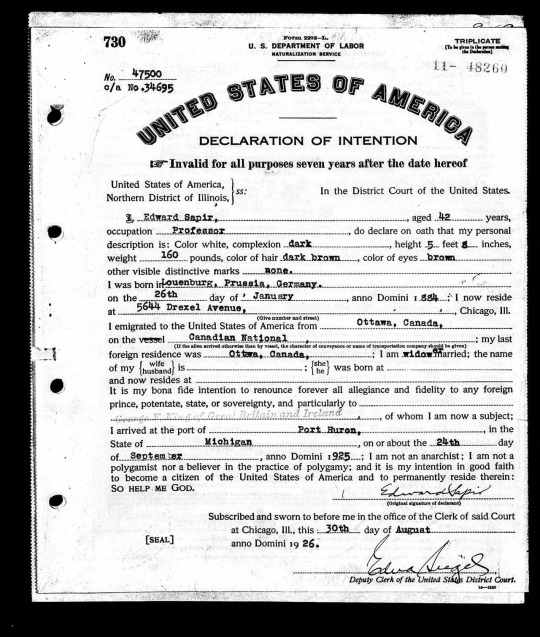
Sapir's naturalization papers when he re-became a US citizen to move to Chicago. Sapir was 5′6″, weighed 160 pounds, and had a ‘dark’ complexion. His race is listed as ‘Hebrew’. In his papers he swears he is not an anarchist or a polygamist. Via ancestry.com
Sapir left Canada in 1925 to take a position at the University of Chicago, where Faye-Cooper Cole was trying to build up an anthropology program. Chicago was an upstart university compared to east coast Goliaths like Harvard or Penn, which meant little in the way of reputation but a lot of money thanks to its patron, the oil baron J.D. Rockefeller. It also had a new, German-style organization which focused on research and training up people with a German-style Ph.D. — the older American schools followed the older English college system, which was mostly about teaching undergraduates. Rather than try to establish himself as the center of the new school, Cole hoped to hire a 'superstar' like Sapir to jumpstart anthropology. He hoped that Chicago's money and focus on research would attract Sapir, and he was right. Sapir, Cooper-Cole, and others actually created the anthropology department at Chicago. Previously, it had been part of a joint department of Sociology and Anthropology. They trained up graduate students who would go on to become famous professors, such as Leslie White and Robert Redfield.

“Members of the department of Anthropology at the University of Chicago. From left: John Blackburne, Paul Martin, and professor Edward Sapir and Fay Cooper Cole.” via the University of Chicago. Sapir is in the middle, wearing glasses with his hands behind his back.
During this period Sapir also established himself as an interdisciplinary thinker whose work on linguistics and personality helped connect him with faculty from a wide range of disciplines. In the years after World War I, interdisciplinarity was all the rage: it was hoped that by working together the social sciences could create a unified theory of the sort that was brewing in the natural sciences. During this period, private philanthropic foundations funded most research. In the case of anthropology, the Rockefeller foundation — established by that same Rockefeller who bankrolled the creation of the University of Chicago — was critical. Sapir was at the center of what would become the ‘Culture and Personality’ school of anthropology in the 1930s.
Sapir rode this wave of interest to a new job at Yale, where he moved in 1931. Yale offered him a new anthropology department and the Institute of Human Relations, a special organization which would help fund interdisciplinary work and channel foundation money into Yale. It was his third dream job in a row, and offered an even dreamier salary. This was important to Sapir, who had to support both his large family and his parents as well. It also provided a forum for Sapir to pursue his friendship with Henry Stack Sullivan, the psychologist which whom he was forming his theories of personality.
Yet once again, Sapir's dream job turned out to have many downsides. While he had earned a reputation as a theorist and synthesizer, what he actually loved to was the minute examination of languages. Although he and Sullivan dreamed of founding a new discipline called Personality Studies, what he actually did was produce highly-specialized graduate students whose technical linguistics were the opposite of the generalizing social science Yale was hoping for. And, like Ottawa, Yale wanted him to be an academic entrepreneur who organized research, something Sapir had no appetite for.
Most disastrously, Sapir was out of line with Yale. His colleagues at Chicago had warned him that this bastion of WASP conservatism would be unwelcoming, and they were correct. Jews had only recently been admitted to the faculty, and they were not allowed to teach undergraduates. In fact, they were also not always allowed to be students. When Edgar Siskin became the rabbi of a local congregation in New Haven, he used the opportunity to enroll in the divinity school at Yale to further his education, only to find that Jews were not admitted. Luckily, he found Sapir and became an anthropologist instead. Sapir was even denied admission to the Graduate Club, an institution which faculty members normally joined without issue. Although it had Jewish members, some blamed Sapir’s brusque manners on his difficulties getting admittance.
Sapir might have salvaged his position at Yale, but his poor health intervened. He had a heart condition — the medicine of the day couldn’t tell what specifically was wrong with him — and he grew weaker and weaker. Teaching only made things worse, but he had to keep working in order to support his family. He passed away in 1939, just one week after his 55th birthday.

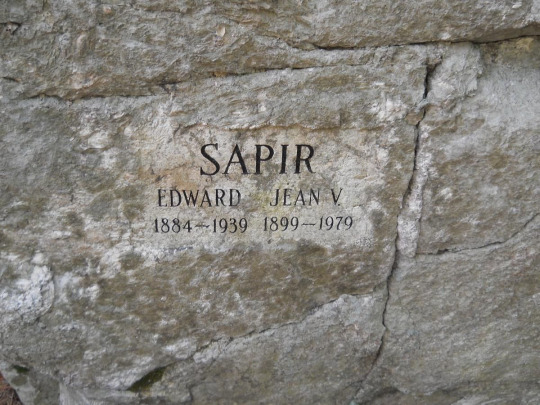
Edward Sapir’s grave, via Find A Grave.
His early death complicated his legacy. His romantic and intellectual rival Margaret Mead managed to make her brand of Culture and Personality hegemonic and downplayed his influence. Sapir's writings were perhaps more influential among linguists than they were among anthropologists. While his influence on the discipline was significant, he is ultimately not remembered for founding a school of thought or training a cadre of students to remember him.
7 notes
·
View notes
Text
“[what I write about actors] is false because I write about them with steadfast love” stepped on my chest with Franz Kafka's entire body weight
for context, entire journal entry below via Franz_K_Diaries on Twitter:
23 October. The actors by their presence always convince me to my horror that most of what Ive written about them until now is false. It is false because I write about them with steadfast love (even now, while I write it down, this too becomes false) but varying ability, and this varying ability does not hit off the real actors loudly and correctly but loses itself dully in this love that will never be satisfied with the ability and therefore thinks it is protecting the actors by preventing this ability from exercising itself. Quarrel between Tschissik and Lowy. Ts.: Edelstatt is the greatest Jewish writer. He is sublime. Rosenfeld is of course also a great writer, but not the foremost. Lowy: Ts. is a socialist and because Edelstatt writes socialist poems, because he is editor of a Jewish socialist newspaper in London, therefore Ts. considers him the greatest. But who is Edelstatt, his party knows him, no one else, but the world knows Rosenfeld. - Ts.: It is not a question of recognition. Everything of Edelstatts is sublime. - L.: Of course, Im well acquainted with him too. The Selbstmorder, for example, is very good. - Ts.: Whats the use of arguing. We wont agree. Ill repeat my opinion until tomorrow and you the same. - L.: I until the day after tomorrow. Goldfaden, married, spendthrift, even if terribly badly off. About a hundred pieces. Stolen liturgical melodies made popular. The whole people sings them. The tailor at his work (is imitated), the maid, etc. With so little room for dressing you are bound, as Ts. says, to get into quarrels. You come off the stage excited, everyone considers himself the greatest actor, then if someone, for example, steps on someone elses foot, which can not be avoided, not only a quarrel but a good battle is ready to break out. But in Warsaw there were seventy-five small, individual dressing-rooms, each one with light. At six oclock I met the actors in their coffee-house seated around two tables, divided into the two hostile groups. A book by Peretz was on the table of the Ts. group. Lowy had just shut it and stood up to leave with me. Until the age of twenty Lowy was a bocher who studied and spent the money of his well-to-do father. There was a society of young people of the same age who met in a locked tavern precisely on Saturday and, dressed in their caftans, smoked and otherwise sinned against the Sabbath commandments. The great Adler from New York, the most famous Yiddish actor, who is a millionaire, for whom Gordin wrote Der Wilde Mensch and whom Lowy in Karlsbad had asked not to come to the performance because he didnt have the courage to act in his presence on their poorly equipped stage. - Real sets, not this miserable stage on which you can not move. How shall we play the wild man! You need a sofa for it. In the Crystal Palace in Leipzig it was magnificent. Windows you could open, the sun shone in, you needed a throne in the play, good, there was a throne, I walked towards it through the crowd and was really a king. It is much easier to act there.
2 notes
·
View notes
Text
Finally got some time to read!
These screenshots come from Franz Liszt’s letters.

Monsieur Pierre Wolff (Junior), Rue de la Tertasse, Geneva, Switzerland (Paris, May 2nd [1832])
Emmmmm. Plans.

From same letter above.
lmao sometimes he also got mad because of practicing
Reminds me that I used to practice 8-9 hours everyday for a competition…what a nightmare…

Same recipient above, May 8th [1832]
What was he doing hhhhhh
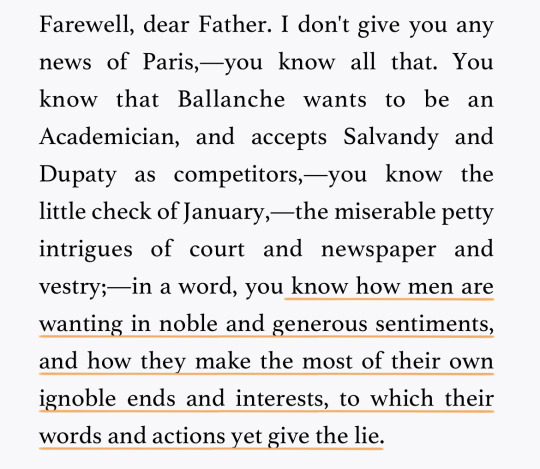
From To Abbe F. de Lamennais, (January 14th, 1835)
I’m sorry but…what an ESFJ-like statement…

To Abbe de Lamennais
Use these words to send my thanks to my tutor and she seemed really shocked 😂


To Breitkopf and Hartel in Leipzig
Can I just say that, it shows at that time, Litz was still in a unstable career…and the cut below will also show this.
Btw he is so busy…I mean, he is in his Europe tour so he needed time to practice, meanwhile he was discussing the publish issues with different publishers, and also, as you will see below, he deal with different relationships, and he even have time to flirt….
Master of Time Management Franz Liszt, confirmed.(jk

…
Enough, Litz, enough.
This is the letter to Robert Schumann!!!!
My friend used said, “Litz has an ability: greet Chopin in every occasion and every time.”
Now I began to believe.
And he even had time to write pieces…omg.

As what I said, his performance career might not satisfied himself because he still need to chase for the premiere of new pieces from great composers, like Monsieur Schumann.
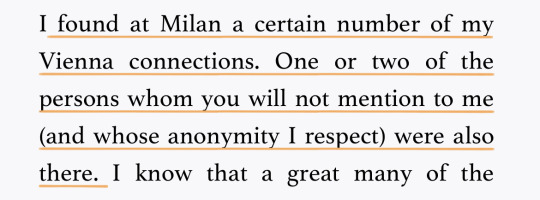
To Simon Lowy in Vienna, in Milan, September 22nd, 1838
Wait…groupies!(no jk
TBC…
0 notes
Text
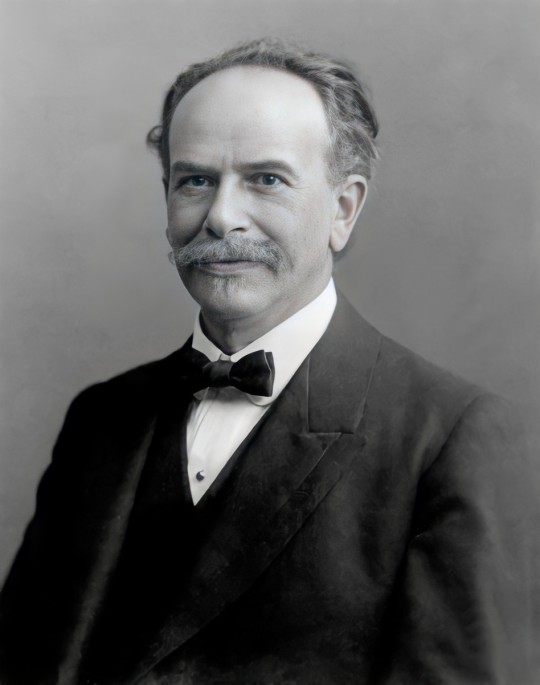
Franz Boas
July 9, 1858 – December 21, 1942
“Furthermore, the study of the present surroundings is insufficient: the history of the people, the influence of the regions through which it passed on its migrations, and the people to whom it came into contact,must be considered.” (Boas, 1982)
Widely considered as both “the father of American anthropology” and “the father of modern anthropology,” Franz Uri Boas pioneered historical particularism: the approach regarded as the first American anthropological school of thought (National Academy of Sciences n.d.; McGee & Warms, 2008). Raised in a German-Jewish household embibed with high ethical teaching, Boas experienced standard preparatory instruction as a son of educated parents (Lowie, 1947). It is in this environment that he was first introduced to the idea of equality of all peoples (McGee & Warms, 2008), which is characteristic of the science he pursued for humanity.
Having been trained in the field of physics and geography, it was only during his expedition in Baffinland among the Eskimo that Boas realized and began his life work of being an ethnographer (McGee & Warms, 2008). After his stint as a museum assistant and university lecturer in Germany, he decided to migrate to America where he carried on with his pursuits in the discipline as a lecturer and curator (Lowie, 1947).
Boas did not concur with the Darwinian process of social evolution, and he contested the fundamental assumptions of the unilinieal social evolutionists during his time (Stocking, 1966). As opposed to assuming the lens of parallel development determined by a universal evolutionary law, Boas asserted that cultural phenomena must be primarily analyzed by looking into the environmental and historical conditions under which the society developed (McGee & Warms, 2008). This method is later on called as historical particularism. Furthermore, aside from advocating for the four-field perspective of anthropology within the academe and the conduct of intensive, “Boasian-style” fieldworks, Boas likewise laid the foundation for cultural relativism (McGee & Warms, 2008, p. 118). This methodological position, used as a rule of thumb in ethnographic research, forwards that a behavior of a society must not be evaluated with the influence of outside standards but rather through the understaning of its own beliefs and motivations (Kottak, 2010).
Considering the transitional status of Boas, his notion and usage of the word “culture” in his writings changed over time. However, by the end of his career, he had already sensed and paved the way for the modern anthropological notion of “cultures,” implying the historical emergence of “individual human groups” (Stocking, 1966, p. 871).
References:
Boas, F. (1982). A Franz Boas Reader: The Shaping of American Anthropology, 1883-1911. (G. W. Stocking, Ed.). University of Chicago Press.
Kottak, C. (2010). Culture. In Cultural Anthropology: Appreciating Cultural Diversity (14th ed., pp. 24-47). McGraw-Hill Education.
Lowie, R. H. (1947). Biographical Memoir of Franz Boas 1858-1942. National Academy of Sciences Biographical Memoirs, 24. Retrieved from http://www.nasonline.org/publications/biographical-memoirs/memoir-pdfs/boas-franz.pdf.
McGee, R., & Warms, R. (2008). Historical Particularism. In Anthropological Theory: An Introductory History (4th ed., pp. 116-120). McGraw-Hill Education.
National Academy of Sciences. (n.d.). Member Directory: Franz Boas. The National Academies of Sciences, Engineering, and Medicine. Retrieved from http://www.nasonline.org/member-directory/deceased-members/20001039.html
Stocking, G. W. (1966). Franz Boas and the Culture Concept in Historical Perspective. American Anthropologist, 68(4), 867–882. Retrieved from https://www.jstor.org/stable/670404.
0 notes
Text


Two recent titles by the prolific Michael Löwy:
Kafka, Welles, Benjamin (French text)—read Michael Löwy's preface on cultural pessimism on his blog.
Redemption and Utopia, (English translation by Hope Heaney): "Towards the end of the nineteenth century, there appeared in Central Europe a generation of Jewish intellectuals whose work was to transform modern culture. Drawing at once on the traditions of German Romanticism and Jewish messianism, their thought was organized around the cabalistic idea of the 'tikkoun': redemption. Redemption and Utopia uses the concept of 'elective affinity' to explain the surprising community of spirit that existed between redemptive messianic religious thought and the wide variety of radical secular utopian beliefs held by this important group of intellectuals. The author outlines the circumstances that produced this unusual combination of religious and non-religious thought and illuminates the common assumptions that united such seemingly disparate figures as Martin Buber, Franz Kafka, Walter Benjamin and Georg Lukács."
Thanks to Valery Oisteanu for recommending Redemption and Utopia.
14 notes
·
View notes
Photo

Louis Jouvet
Photo : Franz Lowy
3 notes
·
View notes
Text
MEINE VORBILDER, IDOLE, HELDEN ODER MENSCHEN, DIE ICH SEHR SCHÄTZE
Natürlich ist diese Liste nicht vollständig. Sicherlich könnte ich sie um viele Persönlichkeiten erweitern. Besonders bei Künstlern, Schriftstellern, Musikern und Schauspielern kämen sicherlich noch viel mehr bewundernswerte Menschen zusammen, die mein Leben mitbegleitet haben. Bei den eher unbekannten Namen habe ich die Funktion in Klammern daneben geschrieben. Einige Namen sind Legendengestalten oder biblische Figuren, zum Beispiel Heilige (HL). Menschen, die ich zum Beispiel während meiner Zeit als Redakteur oder anderwärtig persönlich kennen gelernt habe, sind zum Beispiel auf der Tumblr-Seite fett gekennzeichnet. Unter der Rubrik (Vormärz) versteht man die frühen Akteure der Demokratiebewegung, die leider nicht zum Zug kamen und stattdessen einem autokratischen System weichen mussten, die als Pseudodemokratie bis heute anhält. Im Klartext: Deutschland verträgt keine echte Opposition.
A: Jeanne d´Arc, Hannah Arendt, Ernst Moritz Arndt, Bettine von Arnim, AC/DC, Johann Valentin Andreae (Rosenkreuzer), Alexandra (Sängerin), König Arthus, Adele, Hirsi Ali, Charles Aznavour,
B: Hugo Ball (Schriftsteller), Marianne Bachmeier (Mutter Courage), Sebastian Bach, Gottfried von Bouillon (Kreuzritter), Friedrich Barbarossa, Clemens von Brentano (Dichter), G.L. von Blücher, F.W. von Bülow (Preußische Generäle der Befreiungskriege), Hildegard von Bingen, Beatles, Carl Ludwig Börne (1848ziger), Robert Blum (1848-Rebell), Ludwig van Beethoven, Arnold Böcklin, Max Brodt, David Bowie, Thomas Bernhard, Wilhelm Busch, James Baldwin, M. A. Bakunin (Anarchist), Boetius (Philosoph), Buena vista social Club, Josef Beuys, Samuel Beckett, Sebastian Brandt (Humanist)
C: Cicero, Paul Celan, Carl von Clausewitz (Oberst Befreiungskriege), Leonard Cohen, M. Caravaggio, John Cassavetes (Regis.), Karl August von Cohausen (Archäologe), Charlotte Corday (Rebellin 1790), Robert Crumb, Eric Clapton, Lowis Corinth, Joe Cocker, N.S. Chruschtschow, Sean Connery.
D: Denis Diderot (Aufklärer), Albrecht Dürer, Bob Dylan, Carl Theodor von Dalberg (Aufklärer), Dante, Dido (Sängerin), Alexander Dubcek, Doors,
E: Max Ernst, Hl. Elisabeth, Enya, Eisbrecher (Band), Michael Ende, Umberto Ecco, Joseph von Eichendorff,
F: Gottfried Fichte, Ernst Fuchs, Friedrich der Große, Georg Forster, Caspar David Friedrich, Fleetwood Mac,
G: Theo van Gogh, Franzisko de Goya, Gottfried Grabbe, Che Guevara, Siddharta Gautama, Karoline von Günderode (Dichterin), Georges I. Gurdjief (Mystiker), Matthias Grünewald, Artemisia Gentileschi (Malerin), Gandalf, Brüder Grim, Grimmelshausen, Ralf Giordano (Journalist), Green Day (Band), Florian Geyer (Rebellenanführer), A.N. von Gneisenau (General Befreiungskriege), M.S. Gorbatschow.
H: Hagen, Hermann Hesse, Peter Handke, Hölderlin, Heinrich Heine, E.T.A. Hoffmann, Gottfried Herder, Friedrich Hecker (1848-Rebell), Händel, Villard de Honnecourt (Gotik-Baumeister), Michel Houellebecq, Homer, Herodot, Klaus Heuser (BAB), Gorge Harrison, Andreas Hofer, Johnny Hallyday (Franz. Sänger), Friedensreich Hundertwasser, Werner Herzog, Elmar Hörig (Kultmoderator), Ulrich von Hutten (Humanist), Victor Hugo, Harro Harring (Vormärz),
I: Jörg Immendorff, Henryk Ibsen, Isaias (Prophet),
J. Jesus, Johannes der Täufer, Johannes der Evangelist, Jeremia (Prophet), C.G. Jung (Psychologe), Jennies Joplin, Friedrich Ludwig Jahn (Turnvater)
K: Karl Kraus, Theodor Körner, Franz Kafka, Frida Kahlo, Gustav Klimt, Charlotte von Kalb (Muse), Lee Krasner (Künstlerin), Rainhard Karl (Bergsteiger), Peter Keuer (Grünen-Gründer), Alfred Kubin,
L: Lukas, John Lennon, David Lynch, Flake Lorenz, Andreas von Lichnowski (1848ziger), Cyprian Lelek (1848ziger), Georg C. Lichtenberg, Gotthold Ephraim Lessing, Lanzelot, M.V. Llosa (Schriftsteller), Annie Lenox, Königin Luise, Ludwig A.W. von Lützow (Befreiungskriege), M. Lafayette (Fr. Staatsmann und Aufklärer) Franz Liszt, Led Zeppelin, Hanns Lothar (Schauspieler)
M: HL. Maria, HL. Maria Magdalena, Marcus, Matthäus, Matthäus Merian, Maria Sybilla Merian, Amadeus Mozart, Bob Marley, Edward Munch, Claude Monet, Albertus Magnus (Scholastiker), Merlin, Alma Mahler-Werfel (Muse), Meister Eckard (Mystiker), Moody Blues.
N: HL. Nikolaus, Novalis, V. Nabokov (Schriftsteller), Ningen Isu (Band), Nirvana, Agrippa von Nettesheim (Alchimist), Hannah Nagel (Künstlerin),
O: Josef Maria Olbrich (Jugendstilbaumeister), Rudolf Otto (Religionswissenschaftler), Oomph (Band), Oasis, Mike Oldfield,
P: Platon, Plotin, Pythagoras (Philosophen), Jean Paul, Plinius, Parzival, Tom Petty, Daniel Powter, Procol Harum, Pink Floyd,
Q: Queen,
R: Peter Paul Rubens, Rembrandt, Josef Roth, Ramstein, Philipp Otto Runge, Ludwig Richter, Rio Reiser, Ritter Roland, Rainer Maria Rilke, Erasmus von Rotterdam, Eric Rohmer, Ulrich Roski (Sänger), Rolling Stones, R.E.M. Lou Reed, Chris Rea, Petra Roth (Ex-OB Frankfurt/M)
S: Johann III Sobieski (polnischer König), Sunzi (chinesischer Philosoph), August Schöltis (Schriftsteller), Lou von Salome (Muse), B. Smetanar, Carlos Santana, Sappho (Dichterin), Schopenhauer, Helmut Schäfer (Staatsminister im Auswärtigen Amt) Sokrates, Egon Schiele, Madame de Stael, August Strindberg, Richard Strauss, Philipp Jacob Siebenpfeiffer (Vormärz), Helmut Schmidt, Subway to Sally (Band), Karl Ludwig Sand (Vormärz)
T: B. Traven (Schriftsteller), A. P. Tschechov, Ivan Turgenjev, Ludwig Tieck (Romantiker), HL. Judas Thaddäus, Hermes Trismegistos (Philosoph), P.I. Tschaikowski, William Turner, Lars von Trier (Regisseur)
U: Peter Ustinov, Ludwig Uhland, Siegfried Unseld (Verleger),
V: Luchino Visconti, Leonardo da Vinci, Velvet Underground, Vitruv, Vercingetorix, Francois Villon (Dichter), Walter von der Vogelweide, Robert Vogelmann (Menschenrechtsaktivist)
W: Wim Wenders, Richard Wagner, Otto Wagner (Jugendstilbaumeister) Wagakki-Band, Sara Wagenknecht, Ludwig Wittgenstein (Philosoph), Georg August Wirth (Vormärz),
X: Xhol (Band)
Y: Neil Young, Yvonne (Aktivistin der Gegenöffentlichkeit)
Z: Heinrich Zille, Carl Zuckmayer, Frank Zappa,
12 notes
·
View notes
Photo

Auguste ZAMOYSKI (1893-1970) - Tête de Franz Lowy, 1922
28 notes
·
View notes
Photo


WHY WE SHOULD STUDY AND UNDERSTAND ETHNOCENTRISM
I’m known as Bernadeth Louise A. Torres, a historian and advocate at St. Therese Christian Development Center Foundation Inc. (STCDCFI) in Tacloban City since September 2020.I had concocted the choice to take up the Humanities and Social Sciences (HUMSS) strand to turn into a visionary antiquarian and spotlight on the world's advancement. Since I previously got one, I must be reliably aware of the misuse occurring these days. Quite possibly the most dismissed missions today is the idea of social relativism. Individuals will in general adjust with the contemporary societies, both good and unethical. “Go back to your country”, “ Americans don”t have culture”. The more youthful ages are normalizing these without the act of respectability. Additionally, the individuals who impact them have the force of ethnocentrism, and to dispose of it through social relativism would be my promotion.
The first picture shows that people who lives in a great country tend to pick on people who they think don’t belong in their country due to races. A lot of Americans now a days were seen in news brutally hitting other races or calling them words that’s not appropriate. A lot of young people now a days are standing up to racist and helping them fight off discrimination against racist. The young generations are more open minded.
Did you realize that the Philippines is known to have no feeling of personality? Most Filipinos practice unfamiliar societies, and gradually, its own way of life is vanishing ethnocentrism. Have you known about the term ethnocentrism? If not yet, the conviction of one specific culture is better than the others. The second image above clearly shows probably the best illustration of ethnocentrism. With simply a look at the discussion, I wager that all perusers would identify with it. Why? It is on the grounds that the more youthful ages as of now adjust to this sort of mindset, correct? In the event that you don't, you are phenomenal. Young people, now a days younger generation tent to watch Boy love or BL series from Thailand. Though it might not be popular than K-pop and K-dramas it’s making it’s way in other countries other than Thailand.Thailand is one of many more countries in the world that is successful in the film industry since they have a much-progressed strong methodology of executing ethnocentrism. I'm not asking perusers to go amiss from this matter, in spite of the fact that I should scatter the meaning of social relativism. We are Filipinos. We have the duty to cherish and save our own way of life for people in the future. I concede that I here and there adjust with the contemporary societies we have today since I need to connect with my friends. In any case, I actually authorize different limits each an ideal opportunity to achieve trustworthy respect.
What languages are you mastering or speaking? French, English, Thai, Japanese, Chinese, German, Russian? Just make sure that you will still speak the language that you spoke first.
Cultural relativism is the idea that a person's beliefs, values, and practices should be understood based on that person's own culture, and not be judged against the criteria of another.[1]
It was established as axiomatic in anthropological research by Franz Boas in the first few decades of the 20th century and later popularized by his students. Boas first articulated the idea in 1887: "civilization is not something absolute, but...is relative, and...our ideas and conceptions are true only so far as our civilization goes."[2] However, Boas did not coin the term.
The first use of the term recorded in the Oxford English Dictionary was by philosopher and social theorist Alain Locke in 1924 to describe Robert Lowie's "extreme cultural relativism," found in the latter's 1917 book Culture and Ethnology.[3] The term became common among anthropologists after Boas' death in 1942, to express their synthesis of a number of ideas Boas had developed. Boas believed that the sweep of cultures, to be found in connection with any subspecies, is so vast and pervasive that there cannot be a relationship between culture and race.[4] Cultural relativism involves specific epistemological and methodological claims. Whether or not these claims necessitate a specific ethical stance is a matter of debate.
Reference:
https://en.wikipedia.org/wiki/Cultural_relativism
0 notes
Text
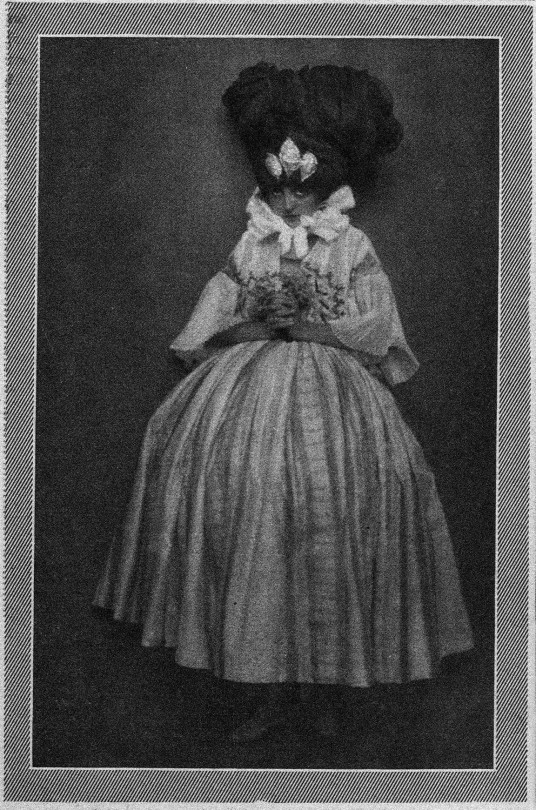
Franz Löwy ~ Maria Ley in Wiener Werkstätte Tanzkostüme. Sport im Bild 47/1921
View & read more on wordPress

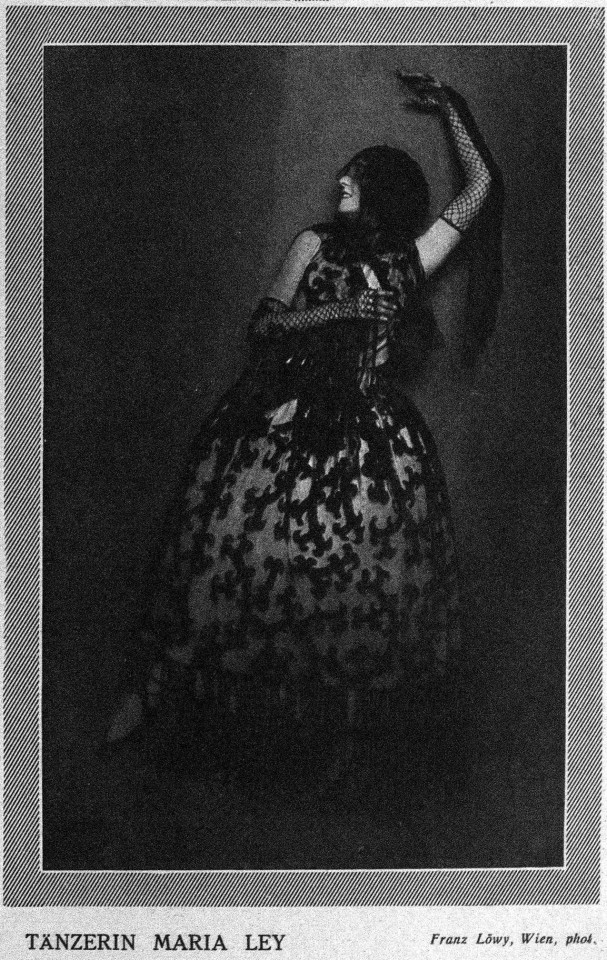
DIE SCHÖNE WIENER TÄNZERIN MARIA LEY die einige Tanzabende in Berlin gab, in ihren neuen, von Professor Wimmer (Wiener Werkstätte) erfundenen Tanzkostümen.…
View & read more on wordPress
#franz loewy#maria ley#Franz Löwy#dance costume#tanzkostum#dance pose#tanzpose#Wiener Werkstaette#Moderne Welt#dancer#Tänzerin#danseuse#danzatrice#bailarina#franz löwy#Franz Lowy#Maria Ley-Piscator#Sport im Bild#tanz#tanzerin#vienna secession#wiener werkstatte#Wiener Werkstätte#women artists
40 notes
·
View notes
Photo
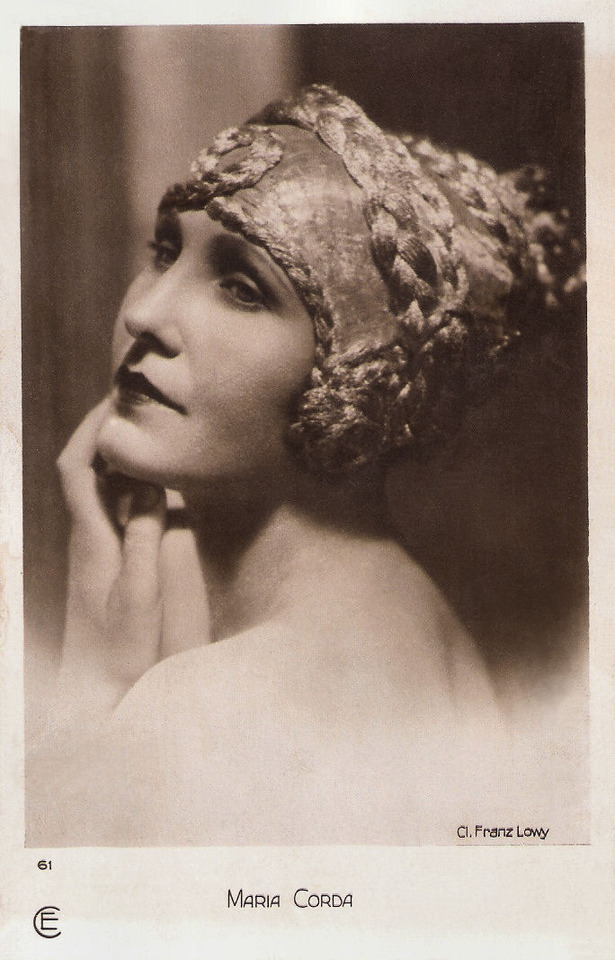
Maria Corda
French postcard by Cinémagazine-Edition, no. 61. Photo: Franz Lowy.
Hungarian Maria Corda (1898 - 1975) was an immensely popular star of the silent cinema of Austria and Germany. The pretty, blonde actress was a queen of the popular epic spectacles of the 1920s, which were often directed by her husband, Alexander Korda.
1 note
·
View note
Text
Un año antes de su muerte, Franz Kafka vivió una experiencia insólita. Paseando por el parque Steglitz, en Berlín, encontró a una niña llorando desconsolada: había perdido su muñeca. Kafka se ofreció a ayudar a buscar la muñeca y se dispuso a reunirse con ella al día siguiente en el mismo lugar. Incapaz de encontrar a la muñeca compuso una carta “escrita” por la muñeca y se la leyó cuando se reencontraron: - “Por favor no llores, he salido de viaje para ver el mundo. Te voy a escribir sobre mis aventuras ...“- Este fue el comienzo de muchas cartas. Cuando él y la niña se reunían, él le leía estas cartas cuidadosamente compuestas de aventuras imaginarias sobre la querida muñeca. La niña fue consolada. Cuando las reuniones llegaron a su fin, Kafka le regaló una muñeca. Ella obviamente la veía diferente de la muñeca original . Una carta adjunta explicó: -"mis viajes me han cambiado … “ - Muchos años más tarde, la chica ahora crecida, encontró una carta metida en una grieta desapercibida dentro de la muñeca. En resumen, decía: -" CADA COSA QUE AMAS ES MUY PROBABLE QUE LA PIERDAS, PERO AL FINAL, EL AMOR VOLVERA DE UNA FORMA DIFERENTE“- . Kafka y la Muñeca... la omnipresencia de la pérdida FRANZ KAFKA LOWY Escritor Austrohungaro Checoeslovaquia 1883-1924
1 note
·
View note
Photo

|• THƯ GỬI BỐ - FRANZ KAFKA •| . Thư Gửi Bố không chỉ là một bức thư mà còn là bản niên giám về tình cha con của Franz Kafka. Hơn một trăm trang có thể quá dài với một bức thư thông thường nhưng lại quá ngắn với một bản niên giám. Chỉ là nó vừa đủ cho cậu bé Franz Kafka giãi bày những cảm xúc những mâu thuẫn nội tâm với cha cậu, ông Kafka. Tôi ngồi đây, với một cốc trà trên tay và lặng nhìn thiên tài văn chương của thế kỷ 20 thực hiện một cuộc giải phẫu đầy đau đớn, nơi ông mổ xẻ chính cơ thể mình, lôi ra từng hồi ức sâu xa nhất. Lột bỏ tất cả, Franz Kafka trở về thành cậu bé Franz yếu đuối tự ti, luôn chui rúc trong căn phòng riêng hệt như một con thú nhỏ. Cậu ở đó, chờ đợi một chút an ủi nơi em gái sau những áp lực từ người cha đáng kính. Ông Kafka cha Franz là một người đàn ông vĩ đại. Tôi không phủ nhận điều đó. Chính Franz cũng ngưỡng mộ cha trong một mức nhất định như đã ngưỡng mộ bất kỳ một "Kafka đúng nghĩa" nào khác. Bởi Franz nhỏ bé dù chảy dòng máu mạnh mẽ nhà Kafka nhưng lại mang đầy đủ bản tính nhà Lowy, mẹ cậu. Franz như tù nhân nhỏ bé bị đặt giữa hai bức tường, một bên là kỳ vọng cậu sẽ kiên cường, nhanh nhạy như một người nhà Kafka chân chính. Một bên lại là bản tính mềm mại, nhút nhát, thậm chí có chút tự ti lẫn u ám phát ra từ sâu thẳm con người cậu. Cha ghét bỏ đứa con trai yếu nhớt này. Mẹ lại chỉ lén lút cân bằng cả hai bên. Chưa ai thật sự nhìn nhận những tổn thương mà cậu bé phải chịu. Dù cha không hề đánh cậu nhưng lại không tiếc dùng lời lẽ công kích tinh thần lẫn khinh miệt khả năng của Franz. Điều đó còn tạo thành vết thương sâu hơn những hành động bạo lực. Cái liếc mắt. Tiếng hừ khó chịu. Những lời chê bai. Tất cả trộn lẫn thành thứ dung dịch độc ác rót vào tâm khảm một đứa trẻ. Franz ngày càng thu mình, ngày càng cô độc. Đến mức cậu chỉ biết chạy trốn vào phòng riêng, những tưởng sẽ an toàn ở đó. Nhưng thật ra dù có đi cách cha bao xa cậu cũng chưa từng thoát khỏi cái bóng quá lớn của ông. Tôi vẫn nghe được tiếng nức nở của một đứa trẻ dưới từng con chữ, dẫu cho đã nhiều năm trôi qua khi Franz viết bức thư đau đớn này. . #book #franzkafka #kafka #thưgửibố😄 #letterfordad #bookaholic #bookstagram #flatlay #igreads #igbooks
0 notes
Link
Australia’s failed bid for the 2022 FIFA World Cup has been yet again been shrouded in controversy, with claims the nation’s top soccer body made ‘improper payments’ in an effort to influence the result.
A new report released on Wednesday by FIFA’s ethics committee has cast doubt over claims by Australia’s soccer officials that the failed bid was completely by the book.
Football Federation Australia spent upwards of $45 million on bids for both the 2018 and 2022 FIFA World Cup, but was forced to pull out of the 2018 ballot and received just one vote for the 2022.
And now the release of the report by chief investigator Michael Garcia questions the assurances made by FFA’s billionaire businessman boss Frank Lowy and former CEO Ben Buckley that Australia’s bid was not at all corrupt.
Australia’s failed bid for the 2022 FIFA World Cup has been yet again been shrouded in controversy, with claims the nation’s top soccer body made ‘improper payments’ in an effort to influence the result
Football Federation Australia spent upwards of $45 million on bids for FIFA World Cup, but was forced to pull out of the 2018 ballot and received just one vote for the 2022 (Former PM Julia Gillard is pictured in an ad for the World Cup bid)
The report questions the work of Mr Buckley – who is now the chairman of AFL club North Melbourne – and to a lesser extent Mr Lowy, in the lead up to the vote.
About Australia’s bid, the report reads: ‘(There is) strong evidence that FFA made improper payments intended to influence the vote.’
The 2018 event was awarded to Russia, while Qatar will controversially hold the 2022 spectacle.
Neither Mr Buckley or Mr Lowy are believed to be directly involved in corruption, and Daily Mail Australia has sought comment from FFA.
In the wake of Qatar’s successful bid claims of widespread bribery were levelled, but investigations by the FFA and federal government found Australia’s bid was clean.
But the Garcia report also reveals claims Australia attempted to specifically influence the bid of disgraced CONCACAF President Jack Warner.
FFA contributed $500,000 towards a ‘Centre of Excellence’ in Warner’s homeland of Trinidad and Tobago, but it’s believed the funds were stolen by the corrupt official.
The report is also critical of two highly paid consultants employed by the FFA to help in Australia’s bid – Fedor Radmann and Peter Hargitary.
The 2018 event was awarded to Russia, while Qatar (pictured) will controversially hold the 2022 spectacle
About Australia’s bid, the report reads: ‘(There is) strong evidence that FFA made improper payments intended to influence the vote’
Mr Radmann, a German businessman, had close ties to Franz Beckenbauer the head of Germany’s successful 2006 FIFA World Cup bid and a key vote Australia sought.
‘In structuring its contract with Mr. Radmann, Australia 2022 sought to create an appearance of distance between the bid team and Mr. Beckenbauer’s close associate,’ the report read.
‘Subsequent devices employed by the bid team and its consultants were seemingly aimed at hiding ties with Mr. Radmann while taking advantage of his influence over Mr. Beckenbauer to further the bid strategy.’
Mr Hargitary also held close ties with high-ranking FIFA bosses, including disgraced former chief Sepp Blatter.
Despite it being a contravention of FIFA’s rules, the report reveals Mr Hargitary sent Mr Blatter a derogatory email in 2009 about the bid of eventual winner Qatar.
While a consultant, he and Jack Warner also encouraged the FFA to pay the travel of Trinidad and Tobago’s under-20s team to Cyprus for a match against Australia.
In total, the FFA paid close to AUD$120,000 for the Trinidad and Tobago team to fly to Cyprus and spend a total of nine nights in accommodation there.
An email from Mr Hargitary to Mr Buckley encouraging him to approve the costs Mr Warner asked for read: ‘Those few Pounds won’t hurt but WILL make a difference!’
FFA contributed $500,000 towards a ‘Centre of Excellence’ in the homeland of disgraced ex-president of CONCACAF Jack Warner (left, with David Beckham)
Prince William, left, and David Cameron, centre, pictured with David Beckham in 2010 during England’s 2018 World Cup bid, have been named in a Fifa ethics report alleging they were present at a meeting to discuss vote trading with a South Korean official
Around the world, the report also dragged Prince William and ex-British PM David Cameron into the murky saga of World Cup vote trading.
The report claimed the prince and Mr Cameron were at secret hotel negotiations during England’s failed bid in 2010.
FIFA’s explosive report into the 2018 and 2022 bidding process was kept secret until it was finally published yesterday – three years after it was written.
Released in full after German newspaper Bild began leaking extracts, it looks at the background to the December 2010 vote.
Prince William, pictured with then Fifa Secretary General Jerome Valcke in 2010, has declined to comment on the allegations through Kensington Palace. England’s bid only received two votes and Russia won
قالب وردپرس
from WordPress http://ift.tt/2tiFxxe
via IFTTT
0 notes
